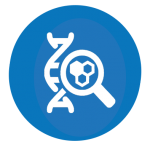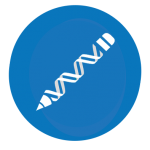As part of our clinical data analysis services, we provide analysis of data coming from clinical trials and patient populations. We regularly analyse and integrate patient demographics data, information about the disease, treatment or outcome, biomarker assay results, or larger scale “omics” data sets. We tailor all analyses, integration, and interpretation of these data types to your research needs.
What We Offer
We offer a comprehensive analysis approach to ensure you get as much information as possible out of your clinical research data, helping to guide future decision making and maximising the return on your investment.
Our robust pipelines and bespoke analyses can be combined for a range of data types that may be collected over the course of a clinical study. Analyses may include the following:
Curation of clinical data
- Often data from clinical studies are scattered or generated from multiple samples per patient or using multiple platforms. We curate and harmonise these data before the analysis.
Assessment of clinical variables
- These may include patient demographics (e.g., age, sex), information relating to study design (e.g., disease status, treatment group), and patient outcomes (e.g., response information, disease progression).
- We check clinical variables for evidence of confounding with each other or with low- or high-throughput assay data. We may also assess these variables as outcomes or as predictors, depending on the required application.
Low throughput biomarker assays
- Flow cytometry data: E.g., cell population frequencies, mean fluorescence intensities (MFIs) for cellular protein abundance
- Immunohistochemistry (IHC) data: E.g., protein biomarker abundances, frequencies of marker expressing cells
- Haematological tests: E.g., blood cell counts, human leukocyte antigen (HLA) typing
- Soluble biomarker assays: E.g., cytokine abundances
- Tumour characteristics: E.g., tumour mutational burden (TMB), microsatellite instability (MSI), immune cell infiltration, mutation status, circulating tumour DNA (ctDNA) detection
- Genotyping information
- Pharmacokinetic/pharmacodynamic measurements: E.g., plasma drug concentrations
High throughput “omics” assay results
- These may be genome-wide or derived using targeted panels. For example:
- Protein abundance
- Metabolite abundance
- Gene expression
- Epigenetic markers
- DNA sequence
- Single cell data types
Benefits of Working with Fios Genomics
Data from clinical studies can be particularly challenging to work with. Challenges include heterogeneity in the population, often-high numbers of missing data points, and the existence of confounding variables. However, at Fios Genomics we have the required statistical expertise to ensure a robust clinical data analysis enabling us to extract as much information as possible from your study.
When you work with us you will benefit from:
Dedicated Bioinformatician
A dedicated bioinformatician, backed by an experienced bioinformatics team, will curate all data, identify the most appropriate statistical approach to take and provide a biological interpretation of results
Interactive Data Analysis Report
Receive a searchable data analysis report that includes interactive visualisations of the data. Our reports are internally peer-reviewed and include analysis methods and results (particularly helpful if you plan to publish your research results)
Post-Report Follow-Up
Upon receipt of our data analysis report, we arrange a review call so that your project’s dedicated bioinformatician can talk you through the results and answer any questions you have about the report
Dedicated Project Manager
Your dedicated Project Manager will act as your single point of contact throughout the project. They will ensure everything from data transfer to report delivery runs smoothly and efficiently for you
Large Capacity Computing
When you choose Fios Genomics, you benefit from our large capacity computing and secure data storage facilities, where we store all your raw data, analysed data and your data analysis report
Clinical Data Analysis Applications
There are many useful applications of clinical data analysis including:
Identifying benefits of novel or repurposed treatments
by comparing standard of care.
Identifying biomarkers to predict patient outcomes
Patient outcomes may be qualitative (e.g., response status, occurrence of adverse events), quantitative (e.g., change in tumour size), or time-based (e.g., days to disease progression). These outcomes could be analysed to associate them with clinical variables and/or assay results to identify new biomarkers.
Investigation of drug mechanisms of action
For example, comparison of data from multiple time points in a clinical trial, or between treatment arms, to identify pathways associated with treatment effects.
Developing classifiers to predict patient characteristics
For example, identifying a sub-group of patients that would benefit from a specific treatment, so-called personalised or precision medicine. Often in this case, we would use signature generation and machine learning methods to combine multiple biomarkers to then develop, test and validate a classifier.
Evaluation of drug efficacy or toxicity
Through assessment of effects on pharmacokinetic or pharmacodynamic markers, or disease-associated pathways.
Investigation of disease mechanisms
By comparing patient subgroups, sample types, or samples taken at different time points.
Comparing drug formulations, dose levels or dosing regimens
By assessing effects on pharmacokinetic or pharmacodynamic markers or patient response.
Identifying new pharmacodynamic markers
By assessing association of assay results with other indicators of drug effectiveness.
Our Experience in Clinical Data Analysis
Below is a small selection of projects where we have successfully helped our clients to analyse and interpret their clinical data:
- Identifying tumour fusion burden as a predictor of response to immunotherapy in prostate cancer
- Associating response to immunotherapy with CD8+ T-effector cell phenotype and increased tumour mutation burden
- Using immune cell count data to demonstrate protective effects of a combination treatment in comparison to chemotherapy alone
We have also helped with:
- Demonstrating drug efficacy in a longitudinal study using plasma cytokine abundances and cell counts from flow cytometry as pharmacodynamic markers,
- Identifying genomic variants associated with pharmacokinetics and drug efficacy in a clinical trial of asthma patients.
Our Reports
Our analysis reports come as an HTML link hosted on our secure server. The secure link contains a password-protected HTML document that is clickable, searchable, and dynamic. This format allows you to easily interrogate and explore your data. Our reports always include all analysis methods, tools and thresholds. In addition, to facilitate sharing of key results in alternative formats such as presentations and posters, all figures in our reports can be downloaded as either PDFs or PNGs, and all tables can be downloaded in tabular data formats.
Example Clinical Data Analysis Report
To demonstrate what you can expect from a Fios Genomics clinical data analysis report, we have an example report available: Immunological phenotype, response to therapy and survival. This data analysis report features study data taken from a single-arm phase-II trial investigating the effects of atezolizumab in metastatic urothelial carcinoma patients. To view this report contact us and ask for our ‘Survival’ example report.
Our Testimonials
I had a positive experience with Fios Genomics from start to finish. Speaking to Fios staff about my project gave me confidence in their expertise and this was evident in the data analysis report they provided me with, which arrived exactly when I expected it to. I would happily use Fios Genomics’ services again in the future.
Companies We Have Worked With
Request a Quote
Further Information
A typical analysis of clinical data includes:
- An initial curation of all available data that is relevant to the study, including summaries of available samples and data types.
- Identification of associations between biological and patient demographic or technical variables. For any clinical study, we perform a full assessment of potential confounding. We can offer advice on stratification/study design based on distributions of clinical variables and will select suitable statistical methods allowing confounding variables to be accounted for, improving sensitivity for detection of patterns and ensuring results are as robust as possible.
- Exploratory data analysis to assess overall sample quality, identify possible outliers or batch effects, and identify interesting patterns in the data.
- Appropriate QC and normalisation procedures if necessary.
- Association testing. Clinical studies are often multifaceted and may include a combination of different analyses. The statistical approaches we employ will depend on the data types, the study design and the clients’ research questions. Our dynamic report will include results, broken down into easy-to-digest segments.














